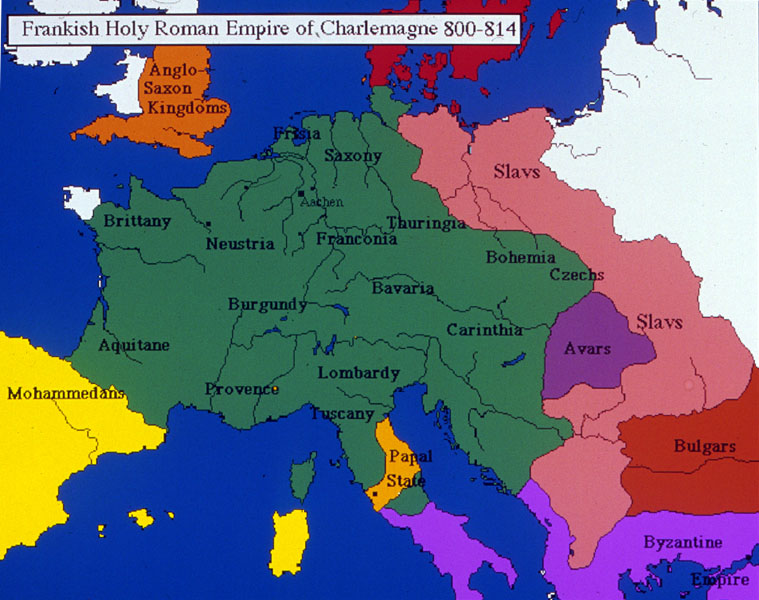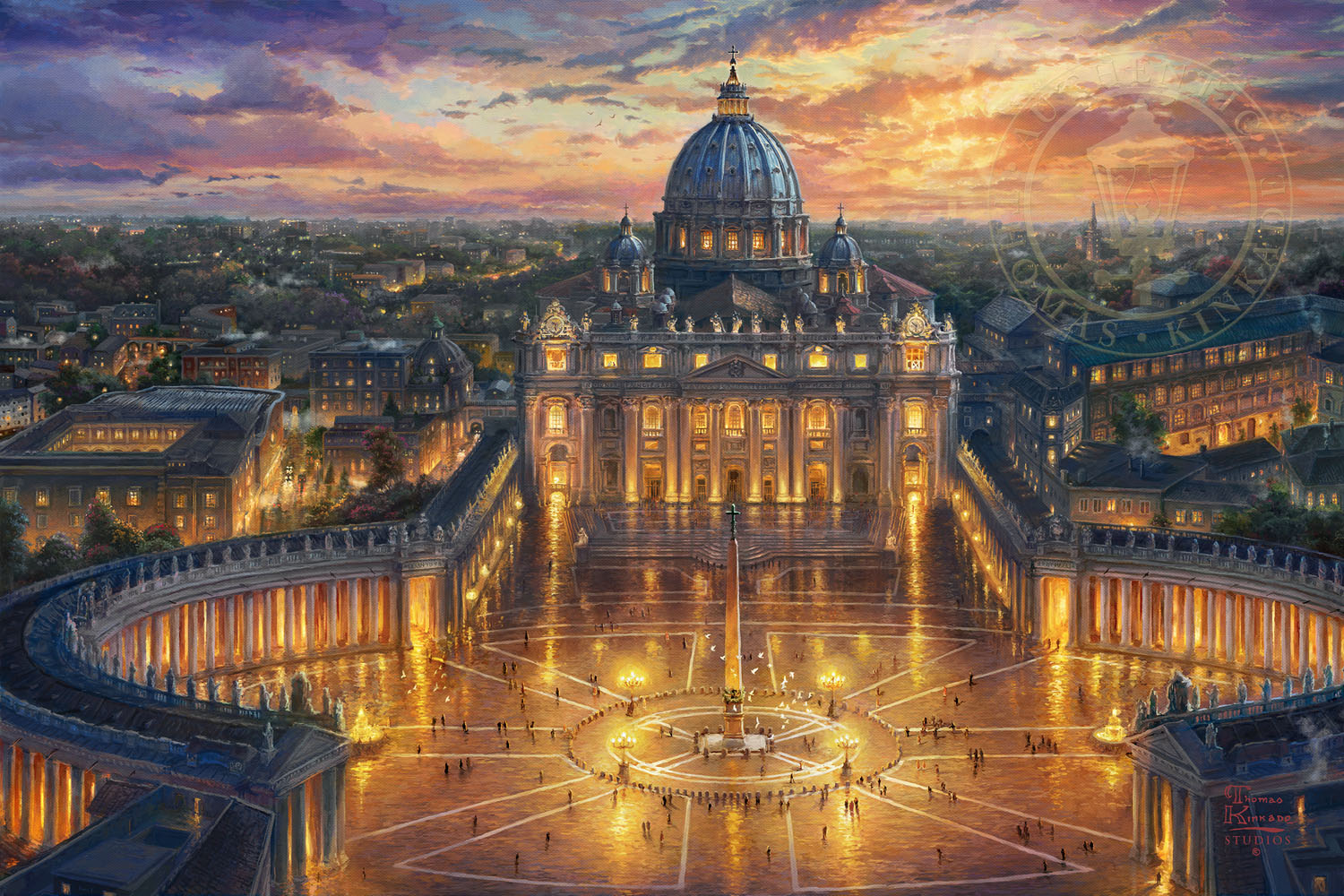《Avatar: The Wild Lands (A Medieval 'Avatar: The Last Airbender' Fiction)》(Trivia) Historical Inspirations behind the Wild Lands
Advertisement
The Four "Nations"
The Holy Roman Empire, the real Empire of the Holy Flame


(Green on the left map: Charlemagne's Holy Roman Empire; Red in the Second Map: Empire of the Holy Flame)
In the Wild Lands, the Empire of the Holy Flame is the Fire Nation. It is an electorate of many smaller medieval kingdoms that must get together in Imperial Diet to elect a sovereign Emperor. The Emperor must defend his elector-princes against foreign invasions and guarantee the sovereignty of the Penitent Faith (Equivalent to Catholicism in our timeline).
That is exactly how the Holy Roman Empire functioned. Lettow 'The Great', founder of the Empire of Holy Flame, is based on Charlemagne. Both conquered many lands and crushed the heathen kingdoms (the Spirit Cultists in the Wild lands are equivalent to the Pagans in our timeline) that threatened their people.
While many nations left the Holy Roman Empire throughout its long history, the Empire was only really dismantled by Napoleon Bonaparte more than 1000 years after its foundation by Charlemagne.
(Note: All the Dukes and Kingdoms from the Empire are also based on real domains. The Duchy of Polk, per example, is like Poland. The Duchy of Sforza, home of the protagonist, is obviously related to Italy - hence the italian words blended in the dialogue)
The Viking Kingdoms, the real Tribes of the North Sea

Historically, Vikings sailed the North Sea from Scandinavia after the Roman Empire's authority became fragile. They raided and conquered many lands, including plenty of territories in England, Ireland and Scotland. In the Wild Lands, we have TWO North Sea tribes: the Eastern, which is located in Skandinavia and is the original home to the Northmen (The Vikings from Norway, Sweden and Denmark); and the Western, home of Thyra, which is of course in the British Archipelago (called Alba in the Wild Lands).
Advertisement
Yet history differs from the lore of the novel when you take in consideration that the Western Tribe (in Alba) formed its own cultural identity and became akin to the historical Picts (somewhat ancestors of the Scottish people), specially after the Emperor of the Holy Flame Lettow conquered the south of Alba and created the Kingdom of Alba (Kingdom of England), much alike William The Conqueror, Duke of Normandy, historically took England from the Saxons in the 12th century.
In the lore, Lettow rose the Wall of Siegfrieda (based on the historical roman-built Adrian Wall) to keep the Northmen isolated in the north section of Alba. Since his conquest, the Western Tribe of the North Sea has been trying to reconquer its lost home. Their war is based on William Wallace of Scotland. Basically, Thyra is Mel Gibson.
The Umayyad Caliphate, inspiration of the Caliphate of Camarilla

Since we haven't explored the East yet in the novel, I'll be brief: the Caliphate of Camarilla is based on the Umayyad Caliphate and the Ottoman Empire. Both nations conquered territories deep into Africa and Europe. They posed an ominous threat to the european kings.
The Cult of Moon / Cult of the Camarilla has, of course, islamic inspiration.
The Church of Heaven's Shrine's inspiration: The Roman Apostolic Catholic Church.


We haven't explored the Church of Heaven's Shrine in depth, yet. So here is the inspiration to what we already know: the Church of Heaven's Shrine makes obvious references to the Catholic Church. The practices of Inquisition / Exorcism from the novel (In the lore, inquisitors are member of the Church responsible for hunting Spirit Cultists and imprisoning weaker Spirits that threaten the population) are adaptations of real attributions that the Church had. Flavius, a missionary with terrible luck, came to convert the Western Tribe of the North Sea and ended up imprisoned; which is also based on a common fate of most catholic missionaries.
Advertisement
While the Church is similar, the Penitent Faith differs a lot from Christianity. The fact that the Grey Guardian, its central piece of adoration, supposedly lives on top of the equivalent of the Vatican City and that its tower can only be climbed by the one who bends the Four Elements is already a huge distinction.
The inspiration for some of the characters and legends
Johann Martel, the Bow of the Trentino, a Firebending Archer who is a master to Verano: Obviously based on Switzerland's William Tell.
The Sword of Caliburn, a legend referenced in a Fragment of Lore: Based on the arthurian legends of the 'Blade of the Stone' and 'Excalibur'.
Lettow 'The Great', founder of the Empire of the Holy Flame: Charlemagne, obviously.
The Legend of Bewulf, the rich Northman who supposedly entered Val-Hella through the Spirit Portal of the North: Based on the epic of Beowulf.
The Caliph of the Caliphate of Camarilla: Obviously inspired by Muhammed, the founder of Islam.
The Kingdoms of the Empire of the Holy Flame: Aarchen = somewhat Austria and Germany, Litvia = somewhat Lithuania / Baltic Regions, Alba = England; Badajoz = Leon + Castille (Spain).
The Rings of Nibel, the gift that the Spirits of the Deep scattered across the North Sea so the Northmen would explore the waters and develop a culture of navigation: Based on the Lord of the Rings's rings which are based on the Nibelungen Myth from norse mythology.
The Middle Sea = The Mediterranean Sea.
Advertisement
- In Serial29 Chapters

Welcome to Anarchy: A BNHA (MHA) Fanfic
'I've already experienced one omnipotent being flinging me from one Universe to another...I didn't need another one to destroy what I had just achieved and fling me off into the next' Charlotte Syrup, former Sweet Commander of the Big Mom Pirates, flung into the world of My Hero Academia with no clue what anything is. Quirks? Heroes? Buttcheek clenching superpower? The only thing that comforts me is the fact that this does remind me of 'Earth'...right? Watch as the Overpowered Pirate and her love Portugas D. Ace wreck havoc across the world of heroes and villains. Loser: 'You've got to choose a side!' Heroes or Villains? Me: Well, we're Pirates so...fuck you both Loser 2: What kind of Pirate owns a megacorporation?? Me: My bad...*cough* We're filthy rich Pirates. Wanna sign up? Welcome to the Charlotte Group. Take advantage of a racist world? Check. Take advantage of the oppressive laws people are under? Check. Take advantage of quirks? Triple Check. Still hate governments? Absolutely A story about the conflict between the ideals Peace and Justice against Freedom and Privacy. The realization of the impossibility of Total freedom and the lengths she goes to see it done. Just add massive explosions, lots of swearing, and comedy to the mix. This will be a 2 Part story. First part: PARADISE (A.N): If someone sends me a better title, I will use that. Deal is still up as well :D) Disclaimers: It is to my great displeasure and sadness that I do not own One Piece or My Hero Academia. Hints of Undertale as well...I don't own that either. That is just really really sad. Nor do I own the cover art...but it's pretty close to how I envision Syrup in her late teen years :) On the flip side, I do own Charlotte Syrup, my OC and a couple more extras in the story. Note: This is the sequel to 'Welcome to the Charlotte Family' but while it is recommended to read it before, it is not needed. Separate Universe, different characters and story. But remember, heavily OP MC! But I try to keep it interesting. Give it a try and enjoy!
8 231 - In Serial10 Chapters

Sparkle
After a century of slumber a Dungeon Core awakens to find his plans for the future going entirely awry. Paired up with a House Dragon who desperately wants 'Shinies', and beset by adventurers who've never seen a dungeon before he has to navigate his way through a life of his own making.
8 237 - In Serial16 Chapters

Commoners Magic
Dropped. I may or may not come back to this. Crear is an ass at the best of times and hates humans as a whole. He wants only one thing in life: Revenge His weapons? His snark and his uncanny abilities as a ranger.His trademark? A blindfold and more snark. But first, he has to get rid of the adventurer group the Guild Master has pushed onto him.
8 143 - In Serial8 Chapters

The Cursed Sword Of Hephalio
A man befallen with some terrible luck due to a combination of unfortunate circumstances and as well as the work of a noble, Mathias Sparrow is doomed to be a slave for Nobles. And yet with a twist of fate and a bit of luck he encounters something that changes his life forever. The Cursed Sword of Hephalio. Follow him on his journey to uncover what secrets this sword contains and what curses it will unleash upon our poor protagonist. But first, he needs to escape his life as a slave for his journey to even begin.
8 177 - In Serial22 Chapters

The Sleeper's Serenade
An age ago, the last of the gods ascended. Centuries have come and gone without them hearing their true names. A poor fisherman and a worse drunk, Harpis Akkeri, is stumbling and struggling to find his place amidst the bitterly divided city-states of his home. Unknown to most, there is a secretive organization keeping order through manipulation and murder, but are they the puppet or the puppet master? Not all who work in the shadows are willing to suffer them, and the greater good for all does not always suit those who execute it. Facing death, in a moment with nothing to live for, Harpis finally begins to fight. If he can find his voice, the gods may yet have ears that listen.
8 102 - In Serial25 Chapters

A Mindful Relationship [Jensoo]
A world where you can talk to your soulmate through your thoughts alone. A mystery of who your soulmate would be begins now in the life of Kim Jennie. Who would it be? ...Inspired by Soulmate Accident converted by @blinkbell
8 140







 Prev Chap
Prev Chap Next Chap
Next Chap Chap List
Chap List
 Boy
Boy Girl
Girl
